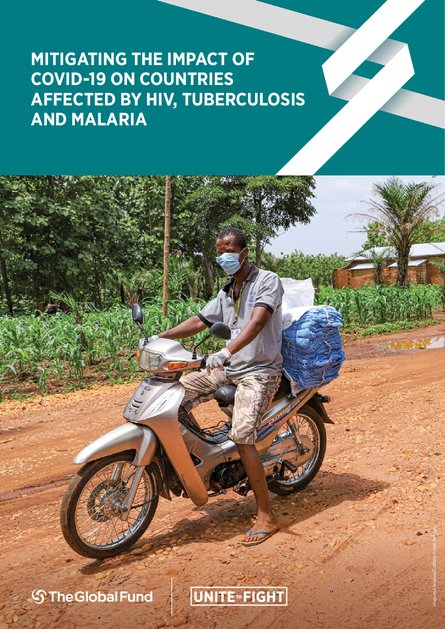
EXECUTIVE SUMMARY
The COVID-19 pandemic threatens to reverse the extraordinary gains made by the Global Fund to Fight AIDS, Tuberculosis and Malaria partnership in the fight against the three epidemics. In 2020 we will likely see increases in deaths and new infections across all three diseases for the first time in many years as health and community systems are overwhelmed, treatment and prevention programs are disrupted, and resources are diverted. In many of the countries most heavily affected by HIV, TB and malaria, the knock-on impact of COVID-19 on these three diseases in terms of incremental deaths may outweigh the direct impact of the virus.
While many of the countries hit by the COVID-19 in the first few months of the year are now beginning to relax lockdown measures as infection and death rates fall, in the regions most affected by HIV, TB and malaria, such as Africa, South Asia and Latin America, the pandemic continues to accelerate. In lower resource settings, lockdowns are less effective and hard to sustain, and clinical care facilities are extremely limited. In such environments, the response to COVID-19 must focus on containing the pandemic’s spread as far as possible through testing, contact tracing and isolation, protecting the health workforce through training and the provision of personal protective equipment (PPE) and minimizing the knock-on impact on other diseases through shoring up fragile health systems, and adapting existing disease programs.
The stakes are extraordinarily high. In 2018, deaths from HIV, TB and malaria together amounted to 2.4 million people worldwide – roughly half the death toll of the peak of the epidemics, but still a shocking figure. Analyses from WHO, UNAIDS, the Stop TB Partnership and others suggest this annual death toll across the three diseases could nearly double, wiping out years of progress, if we do not act decisively. The scale of the disruption to HIV, TB and malaria as a result of COVID-19 is indicated by the latest Global Fund survey, covering 106 countries, which suggests that approximately three-quarters of current HIV, TB and malaria programs have been impacted.
For the poorest and most vulnerable communities already affected by HIV, TB and malaria, COVID-19 represents a fundamental threat. Not only are they extremely vulnerable to COVID-19 itself, but they are likely to be even more at risk from HIV, TB and malaria. The economic impact of COVID-19 will also fall most heavily on such communities, so nutritional deficiencies and the collapse of services will exacerbate their susceptibility to disease. For those struggling to escape acute poverty and marginalization, this is a terrifying prospect. For those facing stigma and human rights-related barriers to accessing health services, COVID-19 intensifies the challenges. Gender inequalities will also be heightened, considering women are overrepresented in lower levels of the health workforce and face higher rates of income insecurity.
The Global Fund has reacted decisively to the emergence of COVID-19, quickly making available up to US$1 billion to support countries as they respond to the pandemic, adapt their HIV, TB and malaria programs, and reinforce their already overstretched systems for health. We are working with global, regional and country partners to mobilize and deploy resources, adapt interventions and share best practices. We are determined to ensure that all the lessons learned from the fight against HIV, TB and malaria are leveraged in the fight against this new virus, including the imperative to act swiftly, to mobilize and empower community leadership, to identify and address humanrights and gender-related aspects of the pandemic, and above all, to leave no one behind.
The Global Fund is a founding partner of the Access to COVID-19 Tools Accelerator (ACT-Accelerator) – a global collaboration to accelerate development, production and equitable access to new COVID-19 technologies. Given the instrumental role the Global Fund played in ensuring access to antiretroviral treatments in response to the explosion of HIV and AIDS in Africa and elsewhere nearly 20 years ago, we understand perhaps more than most institutions the imperative of ensuring equitable and rapid access to new lifesaving tools. Our experience in fighting HIV, TB and malaria also tells us that new tools alone will not suffice. To save lives, new medical tools need to be delivered through effective clinical programs underpinned by resilient and sustainable systems for health that reach those most at risk.